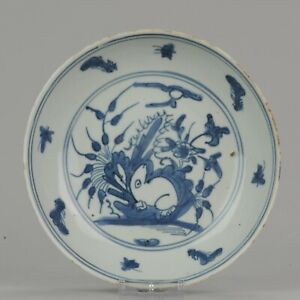Features
- Age: Pre-1800
- Type: Plates
- Region of Origin: China
- Primary Material: Porcelain & Pottery
Features
- Age: Pre-1800
- Type: Plates
- Region of Origin: China
- Primary Material: Porcelain & Pottery
Features
- Age: Pre-1800
- Type: Plates
- Region of Origin: China
- Country of Manufacturing: China
- Primary Material: Porcelain & Pottery
Features
- Age: Pre-1800
- Type: Plates
- Region of Origin: China
- Primary Material: Porcelain & Pottery
Features
- Age: Pre-1800
- Type: Plates
- Region of Origin: China
- Country of Manufacturing: China
- Primary Material: Porcelain & Pottery
Features
- Age: Pre-1800
- Type: Plates
- Region of Origin: China
- Primary Material: Porcelain & Pottery
Features
- Color: Blue & White
- Age: Pre-1800
- Maker: Tianqi (1620-1627)
- Region of Origin: China
- Type: Plates
- Original/Reproduction: Original
- Primary Material: Porcelain & Pottery
Features
- Age: Pre-1800
- Type: Plates
- Region of Origin: China
- Country of Manufacturing: China
- Primary Material: Porcelain & Pottery
Features
- Age: Pre-1800
- Type: Plates
- Region of Origin: China
- Country of Manufacturing: China
- Primary Material: Porcelain & Pottery
Features
- Age: Pre-1800
- Type: Plates
- Region of Origin: China
- Country of Manufacturing: China
- Primary Material: Porcelain & Pottery
Features
- Color: Blue & White
- Age: Pre-1800
- Maker: Chongzhen (1627-1644)
- Region of Origin: China
- Type: Plates
- Original/Reproduction: Original
- Primary Material: Porcelain & Pottery
Features
- Color: Blue & White
- Age: Pre-1800
- Maker: Tianqi (1620-1627)
- Region of Origin: China
- Type: Plates
- Original/Reproduction: Original
- Primary Material: Porcelain & Pottery
Features
- Age: Pre-1800
- Type: Plates
- Region of Origin: China
- Primary Material: Porcelain & Pottery
Features
- Type: Plates
- Primary Material: Porcelain & Pottery
- Region of Origin: China
- Maker: Chongzhen (1627-1644)
- Country of Manufacturing: China
- Original/Reproduction: Original
- Color: Blue & White
- Age: Pre-1800
Features
- Age: Pre-1800
- Type: Plates
- Region of Origin: China
- Country of Manufacturing: China
- Primary Material: Porcelain & Pottery
Features
- Age: Pre-1800
- Type: Plates
- Region of Origin: China
- Primary Material: Porcelain & Pottery
Features
- Age: Pre-1800
- Type: Plates
- Region of Origin: China
- Primary Material: Porcelain & Pottery
Features
- Age: Pre-1800
- Type: Plates
- Region of Origin: China
- Country of Manufacturing: China
- Primary Material: Porcelain & Pottery
Features
- Age: Pre-1800
- Type: Bowls
- Region of Origin: China
- Primary Material: Porcelain & Pottery
Features
- Age: Pre-1800
- Primary Material: Porcelain & Pottery
- Region of Origin: China
- Type: Bowls, Plates
Porcelain Plate Wanli Jiajing Ming Hare Rabbit 1560-1590
Wanli period blue and white plate of a Hare or Rabbit
A Blue & White Ming plate with rabbit or Hare.
Hare or Rabbit is a symbol of longevity and East. It is believed to grind the ingredients of the elixir of longevity on the moon. It is also the forth animal in the Chinese calendar.
Source: Nilson, J. Gotheborg: Antique Chinese and Japanese Porcelain Collectors’ Help and Info Page. Retrieved from the Gotheborg website.”
27-3-19-1-3
Condition
/ / Overall Condition Good, Rimfritting and small chipping, 161mm
Period
16th-century Overall Condition Good, Rimfritting and small chipping, 161mm. Porcelain Plate Wanli
The Ming dynasty is rightly famous for its fine ceramics and especially the cobalt blue-and-white porcelain produced in such towns as Jingdezhen in Jiangxi province. Still highly prized by collectors today, Ming porcelain would have a major influence on the ceramics of many other countries from Japan to Britain.
Jingdezhen (Chingtechen) has grabbed the headlines as the great centre of Ming porcelain but there were other pottery towns producing high-quality wares, notably Dehua and Foshan. Jingdezhen was the first such centre, though, and, thanks to rich local clay deposits, its production of pottery goes back to the Han Dynasty (206 BCE – 202 CE). The town produced pottery vessels for the emperors of the Tang Dynasty (618-907 CE), and by the time of the Ming, it had become one of the great industrial centres of China and probably one of the earliest in the world to reach such a scale of production. The imperial court was a major customer, regularly making huge orders of porcelain from this remote southern town.
As the Ming dynasty wore on, porcelain decoration became much more elaborate, again perhaps in response to foreign demand, especially in Japan and Europe. Porcelain became a major export, along with such goods as silk and lacquerware, and was exchanged, in particular, for Spanish silver which came from the Americas via Manila. The designs by the 16th century CE, then, included multi-coloured scenes using red, blue, yellow, and greens, often with human figures in intricate robes.




















